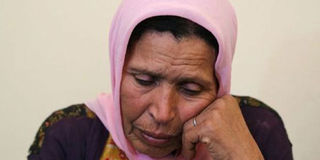Family of Tunisia woman suicide bomber left asking why

The mother of a woman who blew herself up in the Tunisian capital on October 29, 2018 mourns mourns a day later at their family home in Zorda. AFP PHOTO
What you need to know:
- Almost eight years since a revolution that toppled Tunisia's longtime dictator Zine El Abidine Ben Ali, the country's economy is stagnant and around a third of young graduates are unemployed.
- For political scientist Selim Kharrat, the young bomber "has the typical profile of radicalised youth -- often from disadvantaged rural areas, disillusioned and without horizons despite their studies".
The family of an unemployed Tunisian graduate who blew herself up in the capital struggled Tuesday to come to terms with what pushed her to carry out the country's first female suicide attack.
Mna Guebla on Monday detonated explosives near a gathering of police cars on the busy upmarket Avenue Habib Gourguiba in central Tunis, wounding 20 people including at least 15 officers.
Surrounded by neighbours, the 30-year-old attacker's mother Dhahbia sat in shock at her home in Zorda, a marginalised rural area in the eastern Mahdia region.
"Why did you do this to us? What did we do to make you suffer this disaster?" she cried, bitterly addressing her lost child.
"My daughter is a victim. She fell prey to terrorism."
The attack, the first to rock the Tunisian capital since 2015, has "destroyed her entire family, especially her sister and two brothers", Dhahbia sobbed.
Guebla's parents, both illiterate, have been left grappling with what could have drawn their daughter, often glued to the computer, away from their modest family home to carry out such an assault.
"They (terrorists) trapped her because she was naive and fragile, even though we did everything to help her finish her studies... she was very spoiled," said Dhahbia.
"I even sold olive trees to buy her, at her request, a laptop four years ago," she added.
'Isolated act'
Guebla had been busy "preparing for her doctorate, which is why she often isolated herself in her room -- to concentrate on her studies or to send job applications", her mother said.
And despite her seclusion, there were no signs that she was being radicalised.
"There was no change in her character... nothing showed that she had extremist ideas," her mother said.
"Even her headscarf, she wore it since university and she prayed like everyone else," she said, adding that her daughter was not particularly pious.
Guebla had earned an English-language master's degree in business, but she had failed to find a job afterwards and remained at home, often taking care of the family's livestock.
On Friday, she informed her mother and aunt, who also lives with them, that she planned to leave the next morning to spend a few days looking for work in the eastern city of Sousse.
Her uncle told AFP that when she left the house early Saturday he offered to take her to the bus station, but she refused, claiming instead she was going to the doctor in a nearby town.
Guebla died around midday on Monday when the bomb she was carrying exploded. Those hurt in the blast were only lightly injured, according to authorities.
According to the interior ministry, the attack was an "isolated act" and the suicide bomber "was not known for her track record or religious affiliation".
'Marginalisation'
The family was informed of Guebla's death by the police, who brought her two younger brothers in for questioning.
Her father Mohamed, frail since suffering a stroke over the summer, said his daughter had "never hurt anyone... she was surely manipulated".
She was a "model girl, the flower of the family and the most likeable", he said.
He blamed his daughter's "sad fate" on Tunisia's leaders because of their "nepotism and their marginalisation of youth".
Almost eight years since a revolution that toppled Tunisia's longtime dictator Zine El Abidine Ben Ali, the country's economy is stagnant and around a third of young graduates are unemployed.
For political scientist Selim Kharrat, the young bomber "has the typical profile of radicalised youth -- often from disadvantaged rural areas, disillusioned and without horizons despite their studies".
For Guebla's aunt Saida, living with the tragedy will be the hardest.
"If this was to be her end, I would have preferred she was never born," she said.
"She left but now it is us, and only us, who will pay the price... who will continue to live in pain."



